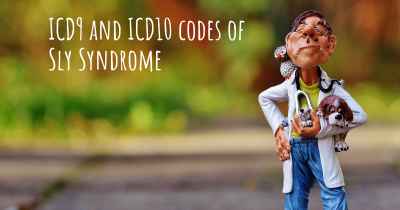What is the life expectancy of someone with Sly Syndrome?
Life expectancy of people with Sly Syndrome and recent progresses and researches in Sly Syndrome

Sly Syndrome, also known as mucopolysaccharidosis type VII (MPS VII), is a rare genetic disorder that affects the body's ability to break down certain sugars. This leads to the buildup of harmful substances in various tissues and organs. The severity of symptoms can vary widely among individuals, making it difficult to predict the exact life expectancy for someone with Sly Syndrome.
However, it is important to note that Sly Syndrome is a progressive condition that can significantly impact a person's health and quality of life. Without proper management and treatment, individuals with Sly Syndrome may experience complications affecting their respiratory system, heart, and other vital organs.
Early diagnosis, appropriate medical care, and supportive therapies can help improve outcomes and potentially extend the lifespan of individuals with Sly Syndrome. It is crucial for patients to work closely with a team of healthcare professionals to manage symptoms and address any complications that may arise.
Sly Syndrome, also known as mucopolysaccharidosis type VII (MPS VII), is a rare genetic disorder that falls under the broader category of lysosomal storage diseases. It is caused by a deficiency of the enzyme beta-glucuronidase, which is responsible for breaking down certain complex molecules in the body called glycosaminoglycans (GAGs). As a result, these GAGs accumulate in various tissues and organs, leading to progressive damage and dysfunction.
The severity of Sly Syndrome can vary widely among affected individuals, making it challenging to predict the exact life expectancy for each case. However, it is generally considered a progressive and life-limiting condition. The disease typically manifests in early childhood, with symptoms becoming more pronounced over time.
Physical Symptoms:
The physical symptoms of Sly Syndrome can include skeletal abnormalities, such as short stature, joint stiffness, and dysostosis multiplex (abnormal bone development). Individuals may also experience coarse facial features, enlarged liver and spleen, hernias, and respiratory difficulties. The disease can affect multiple systems in the body, including the cardiovascular, respiratory, and central nervous systems.
Neurological Involvement:
Neurological involvement is a significant aspect of Sly Syndrome. Individuals may experience developmental delays, intellectual disability, and progressive neurodegeneration. Neurological symptoms can worsen over time, leading to severe cognitive impairment, seizures, and loss of motor skills.
Life Expectancy:
Due to the progressive nature of Sly Syndrome and the potential involvement of multiple organ systems, the life expectancy for individuals with this condition is generally reduced compared to the general population. However, it is important to note that the disease's progression can vary significantly among individuals, making it challenging to provide an exact life expectancy range.
Some individuals with Sly Syndrome may experience a more severe form of the disease, leading to a shorter life expectancy. In these cases, affected individuals may not survive beyond childhood or early adulthood. On the other hand, individuals with milder forms of the condition may have a longer life expectancy, potentially reaching middle age or beyond.
Management and Treatment:
While there is currently no cure for Sly Syndrome, various treatment approaches can help manage the symptoms and improve the quality of life for affected individuals. These may include:
- Enzyme replacement therapy (ERT): Regular infusions of the missing enzyme, beta-glucuronidase, can help reduce the accumulation of GAGs and alleviate some symptoms.
- Supportive care: This involves managing specific symptoms and complications as they arise. It may include interventions such as physical therapy, respiratory support, and surgeries to address skeletal abnormalities.
- Genetic counseling: Families affected by Sly Syndrome may benefit from genetic counseling to understand the inheritance pattern and the risk of passing the condition to future children.
Conclusion:
Sly Syndrome is a rare genetic disorder characterized by the deficiency of the enzyme beta-glucuronidase, leading to the accumulation of GAGs in various tissues and organs. The severity of the disease can vary, and it typically results in progressive damage and dysfunction. While the life expectancy for individuals with Sly Syndrome is generally reduced compared to the general population, it is challenging to provide an exact range due to the variability in disease progression. Treatment options aim to manage symptoms and improve the quality of life for affected individuals. Genetic counseling can also be beneficial for families affected by this condition.








